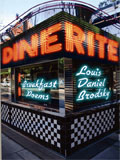Review by Conrad Geller
Time Being Books
10411 Clayton Rd.
St. Louis, MO
ISBN 978-1-56809-125-9
2008, 96 pp., $15.95
www.timebeing.com
The diner, along with the strip tease and the minstrel show, is one of America’s few original art forms. For that reason, I generally invite my foreign visitors to a diner, not an elegant restaurant, for a genuine American experience. My motive here may be parsimony, but not entirely. What I hope to show them at the diner are bedrock Americans, plain, abundant food, a gigantic menu, and a working-class atmosphere. Classic diners, mostly the old ones, the ones that really look like railroad cars, fully represent the essential grittiness, egalitarianism, and friendliness that we like to think are the best of what we are. The best representation of diner culture is probably the classic 1983 film Diner.
So with vivid memories of my breakfasts at the Mount Kisco Diner in New York I opened Louis Daniel Brodsky’s 62nd book of verse, Dine-Rite: Breakfast Poems. (That’s right: 62 books of verse, in addition to scholarly works on Faulkner, prose fiction, and assorted other tomes; Mr. Brodsky has apparently been a busy man.) What I found there was some striking language and interesting ideas but otherwise not much to delight the taste of the inner man.
Dine-Rite belongs to the genre of ensemble description/narrative possibly begun with Chaucer but best represented in modern American poetry by Edgar Lee Masters’ Spoon River Anthology, which chronicled the mostly bleak lives of residents of a small town nearly a hundred years ago. A well-known prose example of the genre is Sherwood Anderson’s Winesburg, Ohio, with its celebration of the “twisted apples” of human nature.
Neither of these earlier works is laudatory toward its human subjects, and neither is this volume. The diner itself, set in an unnamed Texas town, is dirty and rickety, subject to sewage floods and rodent invasions. Its main recurring character, John Marks, the owner of the restaurant, is a corpulent, stingy Baptist preacher who conducts loud, daily Bible discussions in his establishment over his greasy pork and eggs.
Waitresses, strangely, are among the few named characters in the book: Dolly, Rita, Junee. Some of their stories get told—Gina, who glumly refuses to dress in Christmas finery, and Nelda, who dies unmourned and almost unnoticed in the ladies room. Maybe the prominence of waitresses here reflects their importance in the ambiance of real-life diners.
Too often, however, the patrons of the diner are seen only as members of a group. Mainly there is Preacher Marks’ retinue, loud and intrusive, but we see also some coaches from the nearby Catholic high school, with their blunt jockiness and interminable sex talk, a group of golf-playing Jews, looking down their hooked noses at the other patrons. There are groups of firemen, groups of painters, and a few loners leading their expected bleak, desperate lives. Stereotype follows stereotype in what the poet calls “… the entire cast of the human drama.”
Such weary expectedness of phrasing is finally what limits this book, as poetry and as fiction. We hear that Marks looks like “a pregnant hippo.” We have to slog through prosy passages like,
This eatery and its counterparts, nationwide,
Are responsible for maintaining America’s reputation
As a pressure cooker of cultural diversity …
and
This wondrous place never ceases to amaze,
Serve up a cornucopia of gastonomic delights
Of the dessert variety …
that test our understanding of the line between poetry and unimaginative prose.
A diner is primarily, in Brodsky’s word, an “eatery,” so it’s rewarding to find some fulsome catalogs of food, especially in “Easy as Pie,” “After Church,” and “Four-Day Weekend” ( … his corned-beef hash,/ His three-egg, three-cheese omelet,/ His three cornmeal muffins with strawberry jelly,/ His three-cup pot of high-octane brew … ”). None of it comes close to the voluminous description of a country breakfast in, say, Look Homeward, Angel, but some of it does convey that sense of fullness, even distressing over-fullness, that seem to be part of the American diner experience.
I haven’t read any of Brodsky’s other 61 books of verse, so I can’t judge him fairly as a poet. In this book, however, he creates a striking world of hypocrisy and desperation, but he just doesn’t sing about it.